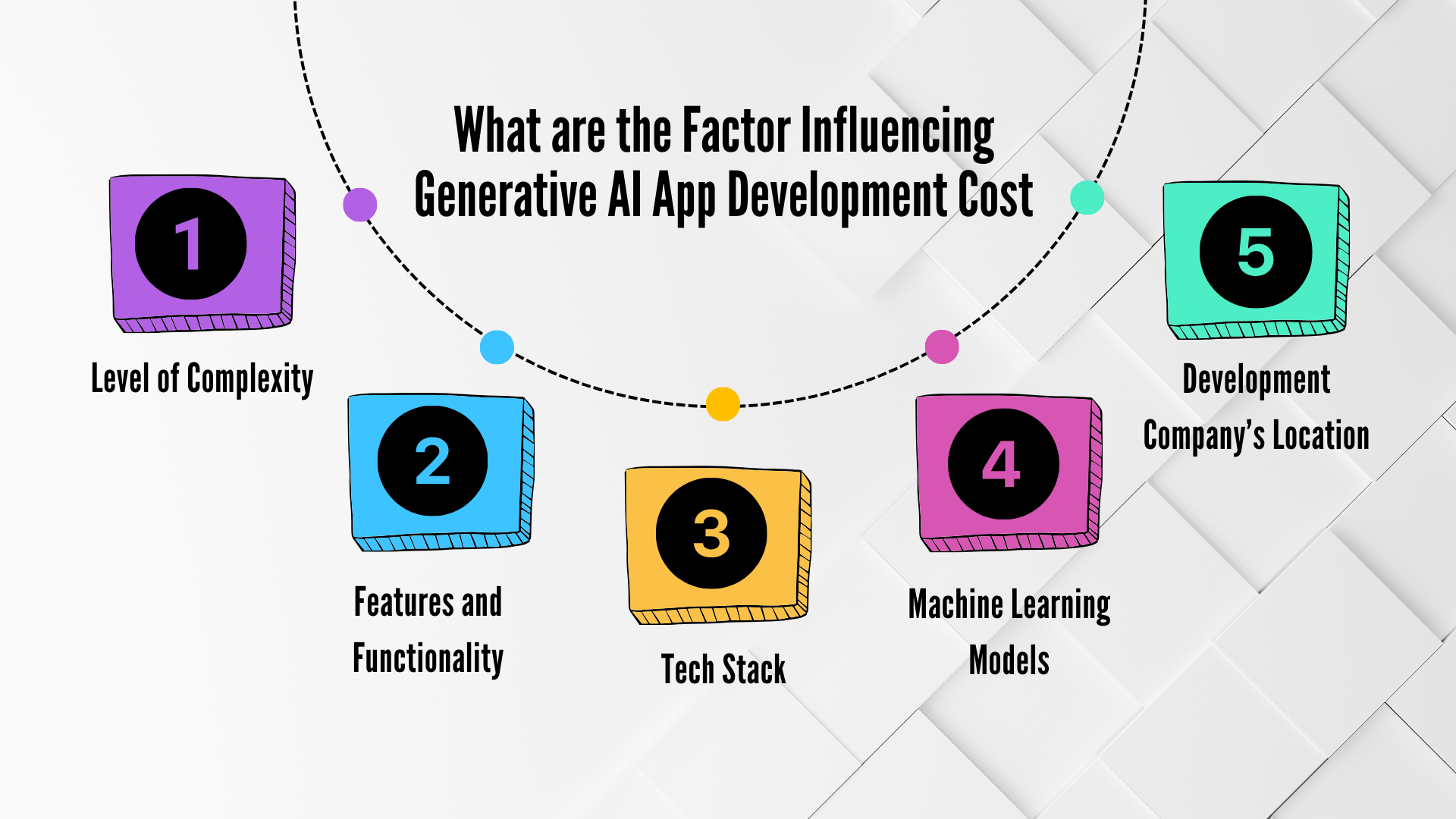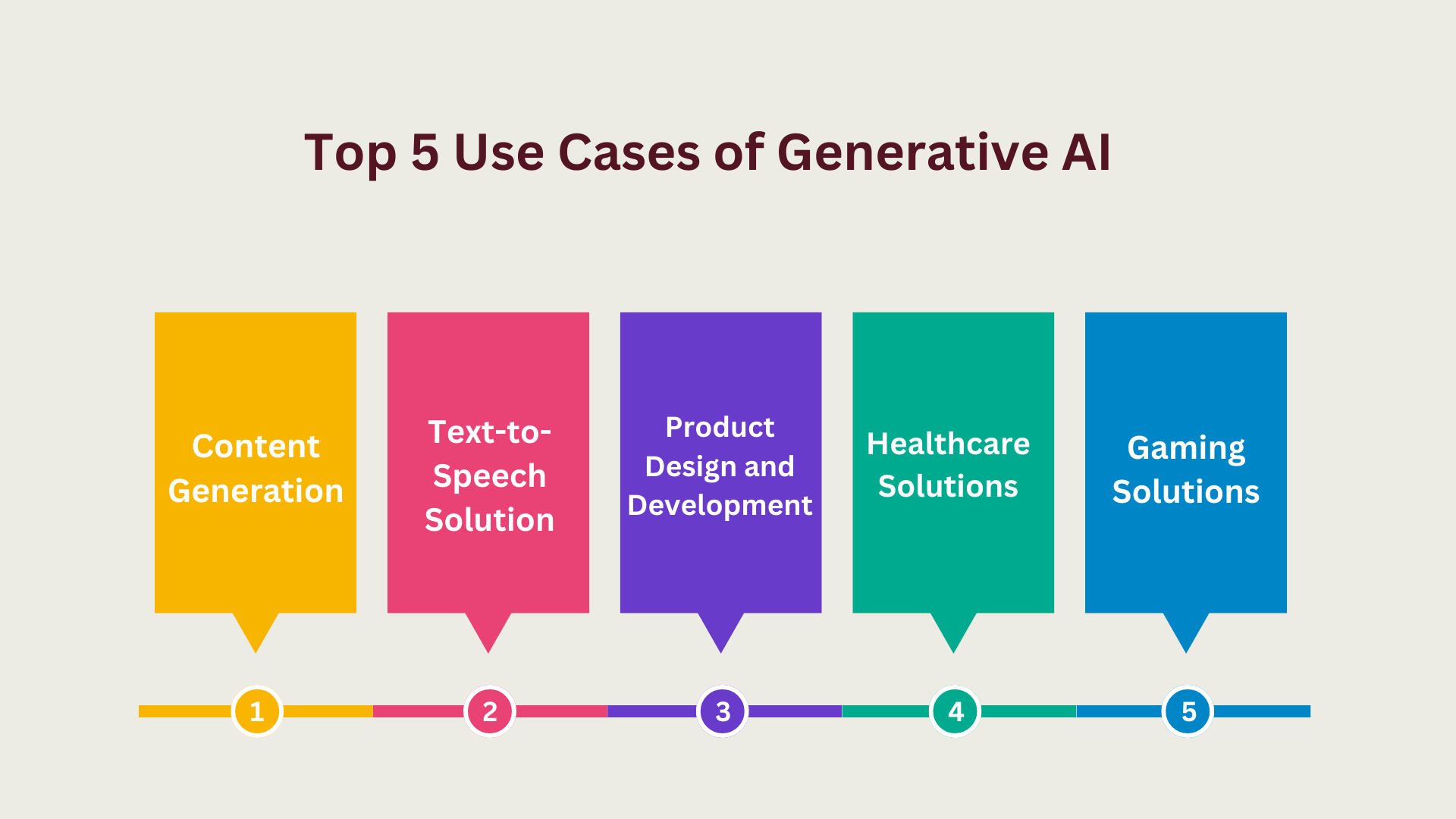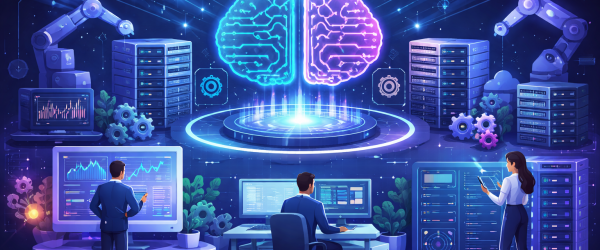Generative AI stands as a beacon of technological progress, embodying the essence of machine-driven creativity and advancement. Its applications extend across diverse sectors including music, art, healthcare, and finance, underscoring its pervasive impact on various industries.
Artificial intelligence has become instrumental in reshaping business operations, heralding a new era of technological evolution. Many enterprises are leveraging Generative AI development services to revolutionize customer support and enhance their offerings.
For those seeking insights into the costs associated with generative AI app development and its potential benefits for businesses, this blog serves as a valuable resource. Herein, we embark on a detailed exploration of the factors influencing generative AI app development costs, providing a comprehensive guide to navigate this transformative landscape. Let’s delve into it!
What is Generative AI?
Generative AI is a cutting-edge technology designed to empower machines in generating content or data with a human-like quality, encompassing various forms such as text, images, 3D models, audio, and video. Unlike conventional AI systems, it possesses the capability to produce entirely original content.
Machine Learning (ML) is pivotal in the realm of generative AI. ML algorithms are utilized to train models in recognizing patterns and understanding data. In the sphere of generative AI, ML is leveraged to facilitate machines in learning from extensive datasets and creating innovative content.
How Much Does Generative AI App Development Cost?
The cost of AI app development hinges significantly on several critical factors, including the features of the generative AI app, the technology stack employed, the size of the development team, and others. It’s essential to thoroughly consider these factors to obtain an accurate estimation of the generative AI app cost.
Nevertheless, to provide you with a ballpark figure for the cost of generative AI app development, a basic application may fall within the range of $40,000 to $100,000. Conversely, a more sophisticated app incorporating advanced technologies and richer features could escalate to $400,000 or beyond.
| AI Development Phases | Cost Breakdown |
|---|---|
| AI Consultation | 10% |
| App UI/UX Design | 20% |
| AI App Development | 45% |
| Testing and Quality Assurance | 15% |
| Maintenance Cost | 10% |
This serves as a rough estimate, emphasizing the pivotal aspects of development cost parameters. Engaging with a professional AI app development company is crucial for comprehensive AI app development services. Additionally, it’s essential to consider ancillary services such as post-launch assistance to ensure the sustained relevance of your app to users over time.
5 Factors that Affect the Generative AI App Development Cost
The cost of developing a generative AI app is determined by a number of aspects. The key factors that influence the cost of AI app development include:
1. Level of Complexity
The intricacy of generative AI applications, such as ChatGPT, AlphaCode, and GitHub, stands as a fundamental determinant impacting cost estimation. Higher complexity levels entail increased demands in terms of time, resources, and effort during development.
During the ideation phase of AI app development, it is crucial to thoroughly outline these aspects. This comprehensive consideration significantly influences the overall cost of AI app development.
2. Features and Functionality
The breadth of features and functionalities desired for your Generative AI app significantly impacts cost. Extensive and complex functionalities necessitate increased development time and expenses.
In scenarios where resources and time are limited, opting for a leaner feature set is advisable. Subsequently, additional features can be integrated as the app gains recognition. Advanced features are crucial for enhancing user engagement and should be prioritized accordingly.
3. Tech Stack
The choice of technology stack, encompassing programming languages, frameworks, and tools, directly impacts costs. Certain technologies may offer more cost-effective solutions, whereas others may necessitate specialized skills and consequently result in higher development expenses. It’s essential to weigh the advantages and drawbacks of each technology carefully to optimize cost-effectiveness while meeting your app’s requirements.
4. Machine Learning Models
The selection of machine learning models and algorithms encompasses various approaches, each with distinct applications and characteristics. Some notable generative AI models include:
- Generative Adversarial Networks (GANs)
- Deep Reinforcement Learning Models
- Variational Autoencoders (VAEs)
- Transformer-based Models
Employing advanced models can elevate development costs due to their intricacy and heightened computational demands. It’s imperative to assess the specific requirements of your project and balance the benefits against the associated costs when choosing the appropriate model.
5. Development Company’s Location
The geographical location of the AI app development company can significantly influence the overall cost. Rates and expenses for AI app developers tend to be higher in regions such as America and Europe. Conversely, companies located in developing countries like India typically offer services at a lower cost compared to their counterparts in developed nations.
Therefore, it’s essential to carefully consider both the location and the size of the company when aiming for budget-friendly AI app development. Choosing the right combination can help optimize costs without compromising on quality or expertise.
What are Generative AI Use Cases and Applications?
Enterprises across diverse industries are increasingly recognizing the potential of generative AI and seeking ways to harness its power. However, many businesses lack the internal expertise to develop artificial intelligence solutions independently. The following discussed use cases of AI illustrate how companies are leveraging this technology to enhance profitability and maintain competitiveness:
1. Content Generation:
Generative AI models, like Generative Adversarial Networks (GANs), specialize in producing novel content such as images, videos, and music. Leveraging neural networks, generative AI learns from existing data to create new outputs iteratively. This process involves a generator network crafting content and a discriminator network assessing its authenticity, leading to continuous refinement and generation of outputs.
For instance, NVIDIA’s Picasso service utilizes generative AI to craft high-resolution, photorealistic images, videos, and 3D content, showcasing its potential within the creative industry.
2. Text-to-Speech Solutions:
Generative AI is deployed to convert text into natural-sounding speech, facilitating tasks such as developing voice assistants and delivering text-to-speech services.
Major companies like Google harness generative AI to power their Text-to-Speech service, offering a diverse range of voices and languages for various applications.
3. Product Design and Development:
Generative AI models play a pivotal role in product design by generating novel design concepts based on existing data. They also aid businesses in early identification of challenges and potential risks during the prototype development phase.
Tools like Autodesk’s Dreamcatcher utilize AI to streamline the design process, providing innovative design options that align with the designer’s specifications. This helps eliminate costly errors and design flaws, ultimately enhancing product quality.
4. Healthcare Solutions:
AI in healthcare has witnessed significant advancements, offering solutions such as generating drug molecules, predicting disease progression, and deriving insights from medical data.
For example, DeepMind’s AlphaFold leverages AI to predict the 3D structures of proteins, improving disease understanding and facilitating drug development.
5. Gaming Solutions:
Generative AI contributes to the gaming industry by generating game elements such as levels and characters. As the metaverse gains traction in gaming, advanced AI presents new opportunities for businesses to innovate and excel.
Companies like Ubisoft leverage AI, as demonstrated by their tool Commit Assistant, which forecasts and rectifies bugs in game code, thereby enhancing game development efficiency and quality.
What are the Future Prospects of Generative AI?
The horizon of Generative AI continues to expand, promising revolutionary advancements across various domains. From healthcare to environmental sustainability, Generative AI stands poised to drive technological progress, heralding an era of unprecedented innovation and problem-solving.
According to Gartner’s projections, by 2025, AI-generated content is anticipated to contribute a significant 10% of all data, marking a substantial increase from the current 1%.
These burgeoning capabilities paint a picture of a future where Generative mobile AI apps will be truly transformative.
As we forge ahead with the aid of generative AI app development services, fostering a culture of ethical consciousness and continuous learning becomes essential. It is through this harmonious approach that the full potential of Generative AI will be realized.
Why Ezeiatech for Generative AI App Development?
As we’ve explored, generative AI is already reshaping our approach to technology, representing a dynamic field that redefines the realm of possibilities.
Understanding the cost estimation of mobile AI app development is pivotal in unlocking these transformative potentials. Armed with a clear comprehension of the investment required, you can now take the critical step forward and actualize your innovative ideas into tangible realities.
At Ezeiatech, we transcend the role of a mere mobile AI app development company; we emerge as your trusted and reliable partner in the journey of digital transformation. Our seasoned experts possess the knowledge and expertise to navigate you through every phase of development. Leveraging cutting-edge technologies like blockchain, AI and ML, Big Data, Cloud Computing, among others, we ensure you stay ahead of the competition and set new benchmarks in your industry.
Thank you for reading. For continued insights and in-depth discussions, please follow our blogs at Ezeiatech.







